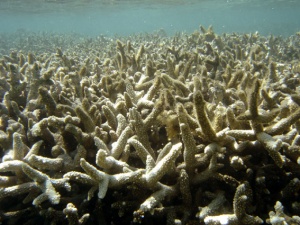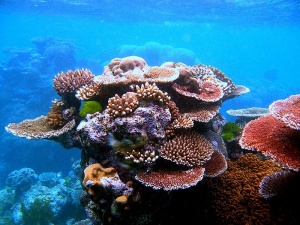EconomicValuation
From coraldigest
Economic Valuation of Reefs
- The economic value of coral reefs is consistently underestimated because of their public and open-access nature. Even though these reefs cannot sell a ticket or a pass to visit them, they still are a huge contributor to tourism, especially in areas like the Caribbean. When we look at the specific economic value of coral reefs, we can look at both the costs and implications involved with reef degradation as well as the actual value of the reef itself. The benefits of reefs include the recreational value as well as the environmental value associated with the species that live there.
Who is affected?
- Jennings and Polunin calculate that 300 people could survive on 1 square kilometer of reef given no other sources of protein. Coral reefs are very diverse ecosystems that much of the world’s population relies on. Because reefs are a source of entertainment for many tourists, they have a substantial recreational value as well. More than 39% of the global population lives within 100 km of the ocean.[1] There are more than 100 countries with coastal reefs. These people rely heavily of the reefs and the water for many aspects of their lives.
Reef Fishing and Loss due to Poor Fishing Practices
- Reefs are most commonly thought of as a tourist attraction. However, there are other ways that people depend on reefs. Reefs are common fishing areas, though fish are not the only useful reef organisms. Other organisms like mussels, crustaceans, sea cucumbers, and sea weeds are also contributors to the economy. Reef fishing makes up about 9-12% of the total global fishing economy, but in some places, like Hawaii, reef fishing makes up around 25% of the local fishing economy. [2]
- Seaweeds, corals, sponges, crustaceans, mollusks and other reef dweller have uses beyond being a source of food. Research is currently being conducted which suggests that some organisms found on coral reefs have medical properties such as AIDS-inhibiting, anti-inflammatory, anti-cancer, antimicrobial, and anticoagulation. Pearls and shells are also used to make jewelry and sold to tourists. Hard corals and skeletons are often exploited and used as building materials because they are so durable. Fish are often taken from reefs and transported around the world to use in aquariums.
Tourism
- It is difficult to give an exact number to the recreational value of coral reefs because they affect many different parts of a local economy. It is estimated that tourism provides $9.6 billion globally in annual net benefits.[1]
- However, this figure does not include tourism spending, which is another huge contributor to the value of the reefs. The amount of spending the tourists do is difficult to keep track of, so the figure of $9.6 billion is not the complete figure. The value of coral reefs and the benefits they bring to surrounding areas depends on a number of different variables. Some of these variables include if its a scuba spot, the ability to snorkel and the travel costs. Diving has the most monetary value. Average value of coral reef recreation is $184 per visit, though the individual values vary greatly between individual locations.[3]
Economic Impact of Reefs
- According to NOAA, though it is difficult to put a dollar amount on coral reef ecosystems that fully encompasses the value we gain from them, a recent estimate gave the total net benefit gained from coral reef ecosystems to be $29.8 billion per year. Specifically, in Hawaii, when the recreational, fishery, biodiversity, and amenity values were combined, their direct economic benefits were estimated to be $360 million per year.
- The Caribbean has the most valuable coral reefs in the world. A recent study in the Caribbean estimates that the changing climate will cause losses of US $109.9 million. This loss is due to increased sea-surface temperatures, sea-level rise and loss of species, among other factors. This economic loss of $109.9 million is equal to 13.8% of the total GDP in the Caribbean.[1] For comparison, the US government makes up about 13.6% of the US GDP. That is like the United States losing every cent of revenue that our government makes from taxes and other sources. Loss from ‘severe’ coral bleaching scenarios with mass coral mortality around the world are estimated around US$ 83 billion.[1]
Costs and Implications of Reef Degradation
- There are very many serious costs and implications of Reef Degradation. The benefits we gain from the natural environment can be separated into 3 types of uses: direct (tourism and harvesting natural resources), indirect uses, and non-uses (where value can be derived without any current human use). The amount that people use coral reefs is consistently underestimated.
- Reefs are valuable because the resources that they provide are very diverse. However, the exploitation of their many uses is unsustainable and has led to the decline in the total value. Recently, poor fishing practices, especially cyanide fishing, has led to the decline of reefs and their fish populations. Economics drive the exploitation of reefs and the use of poor fishing practices. People want to make profits, so they use the cheapest and quickest ways to exploit the reefs. These fishing practices often involve hurting the structures of reefs, poisoning the reefs, or taking too much. For tourists who only see reefs for short intervals, it is difficult to see the long-term implications of poor reef use. Tourists are often uneducated about proper reef treatment and the importance of keeping reefs safe.
- Eventually, these unsustainable practices will cause to fish becoming a luxury good. By destroying their habitats, the marine ecosystem will collapse and our access to fish as food will be very limited, if any at all. If reefs were to disappear, commonly consumed species of grouper and snapper could become just memories. Oysters, clams and other creatures that are vital to many people's diets would also suffer. Experts say commercial fisheries would fail miserably at meeting demand for seafood. [4]
Conclusion
- Coral reefs are obviously very valuable to the global economy. They contribute significantly to many industries. However, as the public is uneducated about the importance of maintaining reefs and the reefs continue to be exploiting, they are declining. Because they are so important economically, this will have very serious effects in the long term, especially for people whose livelihoods depend on healthy reefs. As the reefs continue to decline and be damaged, so will coastal, reef-dependent economies.
References
- ↑ 1.0 1.1 1.2 1.3 Cesar, H, and Burke, L. and Pet-Soede, L (2003) The Economics of Worldwide Coral Reef Degradation. Technical Report.
- ↑ http://www.reef-guardian.org/Pubs/CoralReef-Value.pdf
- ↑ Brander, Luke M., Pieter Van Beukering, and Herman S.J. Cesar. "The Recreational Value of Coral Reefs: A Meta-Analysis." Ecological Economics 63.1 (2007): 209-18.
- ↑ http://usatoday30.usatoday.com/news/world/environment/2010-03-26-coral-reefs_N.htm


